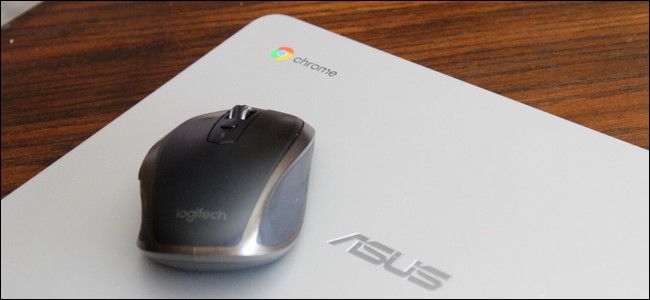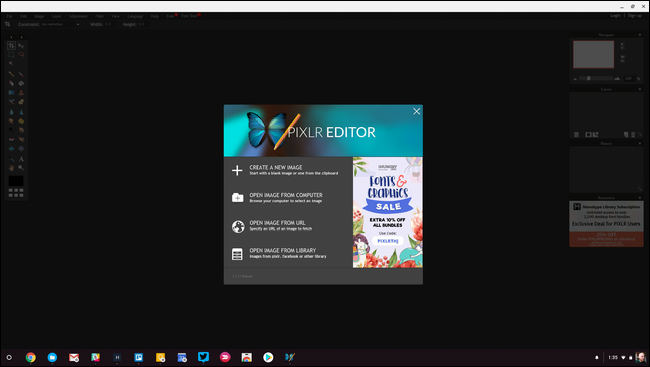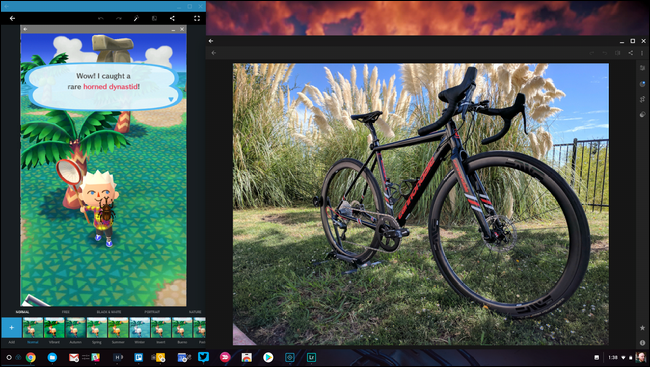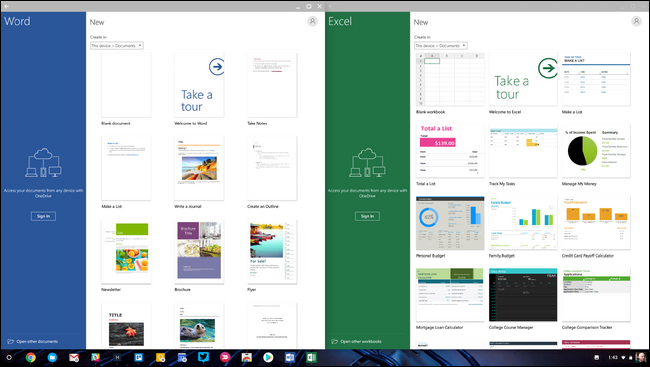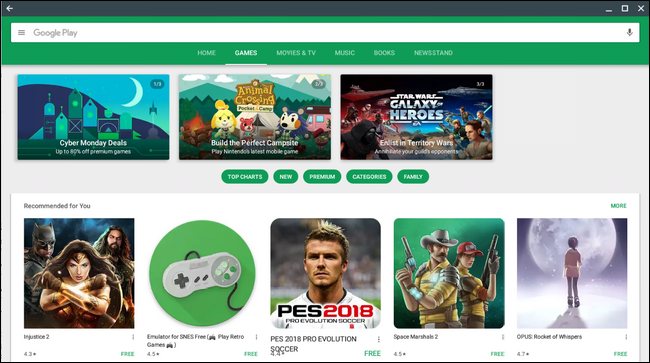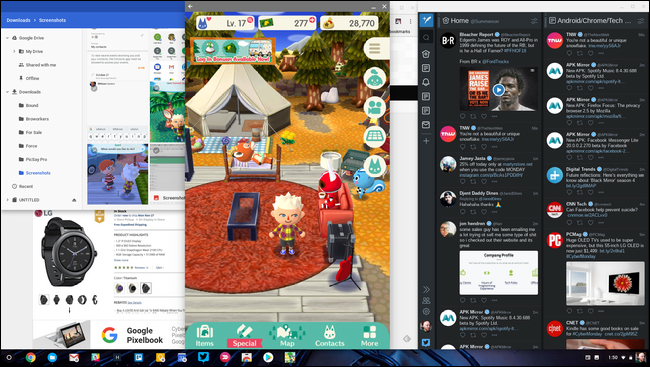Quick Links
Chromebooks have come a long way since their humble introduction with the CR-48 back in December of 2010, but people still think of them as "just a browser". The thing is, this platform has grown significantly since then, and that mindset is just outdated.
I know what you're thinking: "but Cam, Chromebooks are literally just Chrome!" And sure, you're not wrong. Chromebooks are based on Chrome, which is a browser...but there's more to it than that. Chrome is so prolific at this point that, even on a Windows machine, Chrome is basically your OS now. But fine, if you must, let's talk about it.
Chromebooks Have Grown, and So Has the Web
Over the last few years, Chrome OS has gotten better and more advanced. System settings have gotten more in depth, with things like built-in VPN support, multi-monitor support for docked Chromebook setups, Night Light for better night time viewing, and so much more. While I realize it doesn't support the most advanced and granular tweaks that you'll get from something like Windows, it has definitely grown a lot in terms of power user functionality over the last few years---all while keeping the simplicity and straightforwardness that makes Chrome OS special in the first place.
Not only has Chromebook functionality expanded over time, but the web has grown in so many ways over the last seven or eight years. What used to require standalone software can now be run from the web. Take email clients for example: a decade ago, you basically had to have an email client installed to make the most of your mail---be that Outlook or Thunderbird---but now nearly all of that is handled on the web. In fact, Gmail packs more of a punch than most email clients do, so it's hard to recommend against it.
And that's just the tip of the iceberg here. More and more things are capable of being handled exclusively on the web---save for the most niche of needs, like audio or video editing. Even photo editors are available in the cloud these days, with things like Pixlr and Polarr handling a large chunk of what most users need to do. I understand that Photoshop is still the dominant app here, and a lot of people use (and rely) on it, but for most users, the web based options can handle what they need.
That said, this isn't an argument that Chrome OS should be your main OS, it's an argument for Chromebooks and how good they actually are now. That limiting them to "just a browser" undercuts their absolute value.
Android Apps Have Changed the Game
If I had to pick the biggest game changer on Chromebooks, it would easily be the addition of the Google Play Store and Android apps. This was, at least in my opinion, a brilliant decision by Google that not only increased the functionality of Chromebooks by leveraging millions of Android apps, but also opened the door for Chrome OS 2-in-1s to actually make sense. Most Chromebooks can easily double as Android tablets these days, especially if you go with something small like the ASUS Flip C101 or ultra-thin like the Pixelbook.
This also comes into play when you're looking for functionality from your Chromebook that you may not be able to get from the web. While the aforementioned Polarr and Pixlr are great in their own right, you can get the Android versions of Adobe Photoshop and Lightroom from the Play Store for more power. They may not be as robust as their Windows/Mac counterparts, but they definitely push Chrome OS further than it could go before.
Not only that, but Microsoft recently made available the Android version of Office on Chromebooks (as long as you have Office 365). Again, they're not quite as powerful as their desktop counterparts, but you also have Google Docs at your disposal. Between the two, you can get quite a bit of office work done.
The addition of the Google Play Store also brings gaming front and center on Chrome OS---there are thousands of good mobile titles out there that work exceptionally well on Chromebooks. Everything from shooters like Unkilled to racing games like Asphalt 8, you can do more on Chrome OS now that ever before. Plus, who wouldn't want to play their favorite mobile game on a bigger screen?
There Are Things Chromebooks Actually Do Better Than Windows or macOS
Chrome may not be quite as powerful as Windows or macOS, but that can be an advantage, too. Being more lightweight means Chromebooks generally start up faster, have better security, and make setting up a new computer a lot easier.
Not only that, but Chromebooks tend to have excellent battery life, especially when you compare their price directly to a Windows PC or Mac. For example, the $500 ($430 at the time of writing) ASUS Chromebook Flip C302 gets around eight hours of battery life (give or take, of course). To get a Windows machine with comparable real-world use, you'd have to spend double that. And Macs, well, we all know how much you have to spend to get your hands on a Mac. The price-to-battery life ratio is off the charts with Chromebooks.
The same goes for the other guts in your computer. The ASUS C302 has an Intel Core m3 processor and 4GB of RAM. If you were to put a competing OS on that hardware, performance would undoubtedly be abysmal. But since Chrome OS is so lightweight, everything is blazing fast pretty much all the time. I use the C302 as my main laptop, which I work from about 90% of the time, and the only thing I'd change is the RAM---I'd add more. But I'm a heavy user with at least 13 Chrome tabs running, plus Slack, TweetDeck, and Google Keep in their own windows, along with a few Android apps. A bit more RAM would be nice, but for $500, this is the best investment I've ever made in a laptop.
It's Not About Doing Things the Same Way, It's About Doing the Same Things a Different Way
This is my favorite thing about Chrome OS: finding new ways to do things. Sometimes they even turn out to be more efficient than what I used to do on my Windows machine. Or if it's in the case of an Android app (or a collection of apps), I can also do the same things from my phone. For me, Chrome OS has broken down barriers and made me re-think what is possible from a web browser or a mobile OS. Since it combines the absolute best of both worlds---Chrome and Android apps---that work perfectly in tandem, my workflow is dramatically different than it is on Windows, and in some ways it's even more efficient.
For example, I may take screenshots on my Chromebook, but I edit them using Skitch and/or PicSayPro (both Android apps). I use Trello's Android app because it's honestly lighter and faster than the website. I can keep an eye on Twitter and play Animal Crossing: Pocket Camp at the same time. These are the kind of things I actually miss when I'm on my Windows machine.
I won't lie: it takes time and research to find simple ways of doing things that may be obvious on other platforms, and there are very defined barriers when it comes to what isn't possible on Chromebooks. But once you acclimate to those things, you may even find you don't need some of the functionality you thought you did. (And hey---if you want to try before you buy, you can always try Chrome OS in a virtual machine first.)
There are also other power user options available, like adding Crouton access to your machine. Since Chrome OS is based on Linux and uses the Linux kernel, Crouton allows you to run an entire Linux distro alongside Chrome OS---or even in a separate browser tab if that's what you want. You can even run native Linux applications, like GIMP, almost as if they're native Chrome OS apps. All that said, this is a pretty hacky solution and not something really intended for most users. But if you're comfortable using a command line and feel froggy, it's a great project that adds some real muscle to your little Chromebook.
Otherwise, I'm not going to pretend Chrome OS is as versatile as Windows or macOS, but that's never been the point here. I'm simply suggesting that thinking of Chrome OS as "just a browser" isn't really fair anymore, because it's become so much more. Between the growth of the web and the addition of Android apps, there isn't a whole lot Chrome OS can't do outside of the most specialized needs. And really, the web is the future---more and more things are being offloaded to the cloud, and more services are becoming available in a cloud-specific format every day. On that front, Chromebooks are actually leading the pack and will continue to get more and more powerful. Just keep that in mind the next time you read a review of the Pixelbook (or other Chromebook) that can be summarized with "It's a great laptop if all you need is a browser."

